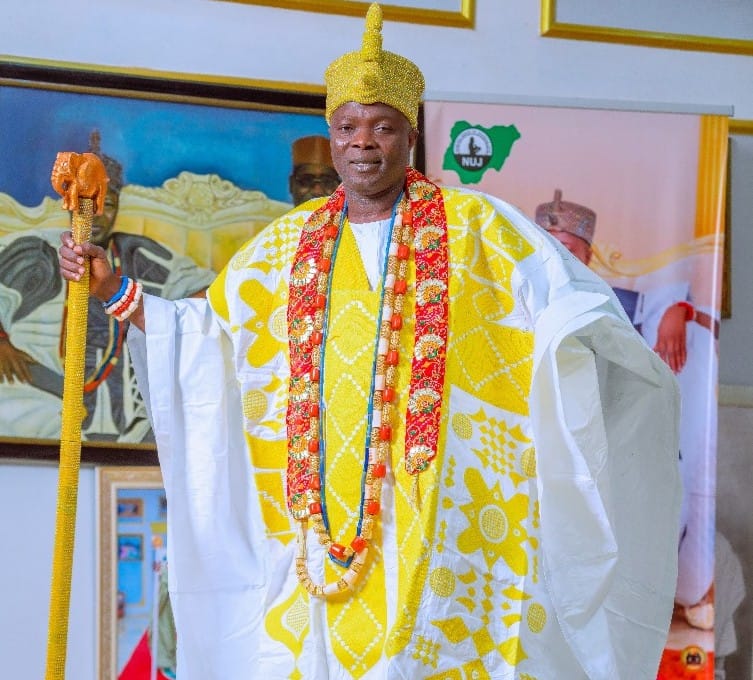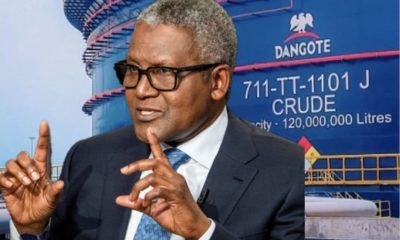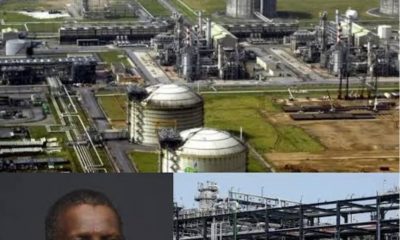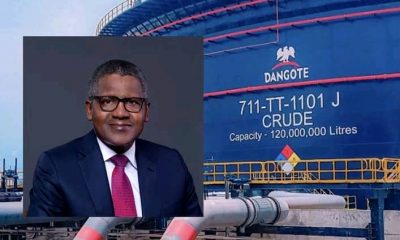Business
Dangote Refinery: A Plea For Caution *by Oba Adekunle Oyelude CON

Dangote Refinery: A Plea For Caution
*by Oba Adekunle Oyelude CON
I am very proud, as I always do home and abroad, to call myself a citizen of Nigeria, the blessed land of my forebears. From the bottom of my heart, I pledge to continue to be proud of Nigeria, come rain, come shine because there is no other place on this planet earth to be called my natural home other than here.
I am also happy to say that my antecedent before and after I ascended to the throne of my ancestors as the 13th Olowu of Kuta in September 2012, has not contrasted my love for and belief in Nigeria, both of which were recognised by the Federal Government of Nigeria in May 2023 when the then President Muhammadu Buhari confered on me the Commander of the Order of the Niger (CON).
In view of this national honour and my status as a royal father, I find it much more obligatory to share my view on the ongoing travail of the Dangote Refinery, a major private investment which sits on 2,635 hectares with a view to producing and exporting petrol and ultimately saving Nigeria foreign exchange.
This unprecedented stride, to my senses, would reverse Nigeria’s reliance on other countries for petroleum supply. I read it that we import about 90 percent of petroleum products we consume locally. I also read that Nigeria imported 11.3 billion dollars refined petroleum products in 2021 alone, making us the 18th largest importer of the products globally.
One can then imagine how excited I was when the news came out that the Dangote Refinery, construction of which started a decade ago and completed with $19 billion, would commence production at the end of the third quarter of 2022 and would reach full capacity in the first quarter of 2023.
I was more excited realising that hundreds of jobless Nigerian, especially our agitating youths would be employed by the 65000 barrel-per-day plant.
I was engrossed in that state of ecstasy and indeed expectant of the implementation of that promise, when suddenly I began to see an alarming sign of a danger to that prospect.
It first sounded like a joke and also appeared like a bad, protracted dream to me until I read that the date of the take-off had been shifted forward due to some logistics, particularly some grey areas needed to be cleared with the sector regulatory authorities.
I was practically down when I read a report alleging that the head of the Nigerian Mainstream and Downstream Petroleum Regulatory Authority (NMDPRA) , Mr Farouk Ahmed made a complaint over the quality of products from the refinery.
The CEO was reported to have complained that the diesel produced by the refinery contains a very large amount of sulphur content which, according to him, is harmful to vehicle engine, hence the continuous reliance on imported products with its predictable consequence on the young refinery.
At this juncture, I am stuck between the devil and the deep blue sea. However, as a royal father, who must not be fair only but must also be seen to be fair, I have the responsibility to call on the government to aid the nationalist objective for which the refinery was built.
Nigeria, our great nation, emerging as the highest private petroleum exporter in Africa, is not a status and prestige we should throw out of the window. I, therefore, crave the understanding of President Bola Ahmed Tinubu on this, for the feat will certainly add to the profile of his administration as that through which Nigeria attained that enviable height among the comity of nations.
This administration can not afford to be seen as putting before prospective investors, unfriendly policies to discourage them from looking to the direction of the country for enterprises that could create jobs for the yawning youths.
President and Chief Executive of Dangote Group, Alhaji Aliko Dangote, in his part, should be more open to further dialogue with the government through the NMDPRA in order to save his dream project this seemingly impasse.
There is no doubting the fact that a number of Nigerians at home and in the diaspora, have attached Aliko Dangote’s name to monopoly of our nation’s economy, allegedly using his proximity with successive admnistrations to sustain his dominance of the economy evidently with his multi-sectoral investments, for instance, in cement, sugar and salt.
I think with his current experience over this multibillion-dollar refinery, it is high time he reviewed that identity by complying with the demands of the government if only for the sake of national interest.
To my understanding of elementary finance, it makes no economic sense for an investor of that magnitude to be operating below his investment capacity level as the refinery is unfortunately experiencing to the disappointment and indeed pains of those of us who had seen a bigger picture of the project that, we had hoped and still are of the belief, would end the perennial fuel crisis the nation has endured for about 50 years.
Owing to the current fuel challenges being faced in major cities of the country, we are impatiently looking forward to the August date which the refinery is expected to supply Nigerian market. We don’t want anything that would push the date forward again.
Finally, federal government should look into the recent findings, through testing, made by members of the House of Representatives led by the Speaker, Honourable Tajudeen Abbas, disclaiming the allegation that Dangote diesel contains high sulphur levels.
To be double sure, the government can take a step further by conducting an independent investigation to ascertain the right quality of Dangote products and compare with those imported by marketers.
We should be mindful of the fact that the success or otherwise of this refinery will spill over to Dangote’s interest in revamping our moribund steel industry. We shouldn’t throw away the baby with bath water.
Mr president as father of the Nation and an undisputed patriot that we all know please safe this Refinery now as many onlookers are already insinuating the current imbroiglo to wrong political calculation on the part of Aliko, clarification of the Refinery as Major critical National Asset that must be jealously protected despite the fact that it’s privately owned is my humble opinion.
God bless the Federal Government of Nigeria. God bless our patriotic President Bola Ahmed Tinubu GCFR.
_*-Oba Adekunle Makama Oyelude (CON) is the Olowu of Kuta, Osun State, Nigeria*_
Business
Nigeria’s Inflation Drops to 15.10% as NBS Reports Deflationary Trend

Nigeria’s headline inflation rate declined to 15.10 per cent in January 2026, marking a significant drop from 27.61 per cent recorded in January 2025, according to the latest Consumer Price Index (CPI) report released by the National Bureau of Statistics.
The report also showed that month-on-month inflation recorded a deflationary trend of –2.88 per cent, representing a 3.42 percentage-point decrease compared to December 2025. Analysts say the development signals easing price pressures across key sectors of the economy.
Food inflation stood at 8.89 per cent year-on-year, down from 29.63 per cent in January 2025. On a month-on-month basis, food prices declined by 6.02 per cent, reflecting lower costs in several staple commodities.
The data suggests a sustained downward trajectory in inflation over the past 12 months, pointing to improving macroeconomic stability.
The administration of President Bola Ahmed Tinubu has consistently attributed recent economic adjustments to ongoing fiscal and monetary reforms aimed at stabilising prices, boosting agricultural output, and strengthening domestic supply chains.
Economic analysts note that while the latest figures indicate progress, sustaining the downward trend will depend on continued policy discipline, exchange rate stability, and improvements in food production and distribution.
The January report provides one of the clearest indications yet that inflationary pressures, which surged in early 2025, may be moderating.
Bank
Alpha Morgan to Host 19th Economic Review Webinar

Alpha Morgan to Host 19th Economic Review Webinar
In an economy shaped by constant shifts, the edge often belongs to those with the right information.
On Wednesday, February 25, 2026, Alpha Morgan Bank will host the 19th edition of its Economic Review Webinar, a high-level thought leadership session designed to equip businesses, investors, and individuals with timely financial and economic insight.
The session, which will hold live on Zoom at 10:00am WAT and will feature economist Bismarck Rewane, who will examine the key signals influencing Nigeria’s economic direction in 2026, including policy trends, market movements, and global developments shaping the local landscape.
With a consistent track record of delivering clarity in uncertain times, the Alpha Morgan Economic Review continues to provide practical context for decision-making in a dynamic environment.
Registration for the 19th Alpha Morgan Economic Review is free and can be completed via https://bit.ly/registeramerseries19
It is a bi-monthly platform that is open to the public and is held virtually.
Visit www.alphamorganbank to know more.
Business
GTBank Launches Quick Airtime Loan at 2.95%

GTBank Launches Quick Airtime Loan at 2.95%
Guaranty Trust Bank Ltd (GTBank), the flagship banking franchise of GTCO Plc, Africa’s leading financial services group, today announced the launch of Quick Airtime Loan, an innovative digital solution that gives customers instant access to airtime when they run out of call credit and have limited funds in their bank accounts, ensuring customers can stay connected when it matters most.
In today’s always-on world, running out of airtime is more than a minor inconvenience. It can mean missed opportunities, disrupted plans, and lost connections, often at the very moment when funds are tight, and options are limited. Quick Airtime Loan was created to solve this problem, offering customers instant access to airtime on credit, directly from their bank. With Quick Airtime Loan, eligible GTBank customers can access from ₦100 and up to ₦10,000 by dialing *737*90#. Available across all major mobile networks in Nigeria, the service will soon expand to include data loans, further strengthening its proposition as a reliable on-demand platform.
For years, the airtime credit market has been dominated by Telcos, where charges for this service are at 15%. GTBank is now changing the narrative by offering a customer-centric, bank-led digital alternative priced at 2.95%. Built on transparency, convenience and affordability, Quick Airtime Loan has the potential to broaden access to airtime, deliver meaningful cost savings for millions of Nigerians, and redefine how financial services show up in everyday life, not just in banking moments.
Commenting on the product launch, Miriam Olusanya, Managing Director of Guaranty Trust Bank Ltd, said: “Quick Airtime Loan reflects GTBank’s continued focus on delivering digital solutions that are relevant, accessible, and built around real customer needs. The solution underscores the power of a connected financial ecosystem, combining GTBank’s digital reach and lending expertise with the capabilities of HabariPay to deliver a smooth, end-to-end experience. By leveraging unique strengths across the Group, we are able to accelerate innovation, strengthen execution, and deliver a more integrated customer experience across all our service channels.”
Importantly, Quick Airtime Loan highlights GTCO’s evolution as a fully diversified financial services group. Leveraging HabariPay’s Squad, the solution reinforces the Group’s ecosystem proposition by bringing together banking, payment technology, and digital channels to deliver intuitive, one-stop experiences for customers.
With this new product launch, Guaranty Trust Bank is extending its legacy of pioneering digital-first solutions that have redefined customer access to financial services across the industry, building on the proven strength of its widely adopted QuickCredit offering and the convenience of the Bank’s iconic *737# USSD Banking platform.
About Guaranty Trust Bank
Guaranty Trust Bank (GTBank) is the flagship banking franchise of GTCO Plc, a leading financial services group with a strong presence across Africa and the United Kingdom. The Bank is widely recognized for its leadership in digital banking, customer experience, and innovative financial solutions that deliver value to individuals, businesses, and communities.
About HabariPay
HabariPay is the payments fintech subsidiary of GTCO Plc, focused on enabling fast, secure, and accessible digital payments for individuals and businesses. By integrating payments and digital technology, HabariPay supports innovative services that make everyday financial interactions simpler and more seamless.
Enquiries:
GTCO
Group Corporate Communication
[email protected]
+234-1-2715227
www.gtcoplc.com
-

 celebrity radar - gossips6 months ago
celebrity radar - gossips6 months agoWhy Babangida’s Hilltop Home Became Nigeria’s Political “Mecca”
-

 society6 months ago
society6 months agoPower is a Loan, Not a Possession: The Sacred Duty of Planting People
-

 society5 months ago
society5 months agoReligion: Africa’s Oldest Weapon of Enslavement and the Forgotten Truth
-

 news6 months ago
news6 months agoTHE APPOINTMENT OF WASIU AYINDE BY THE FEDERAL GOVERNMENT AS AN AMBASSADOR SOUNDS EMBARRASSING









